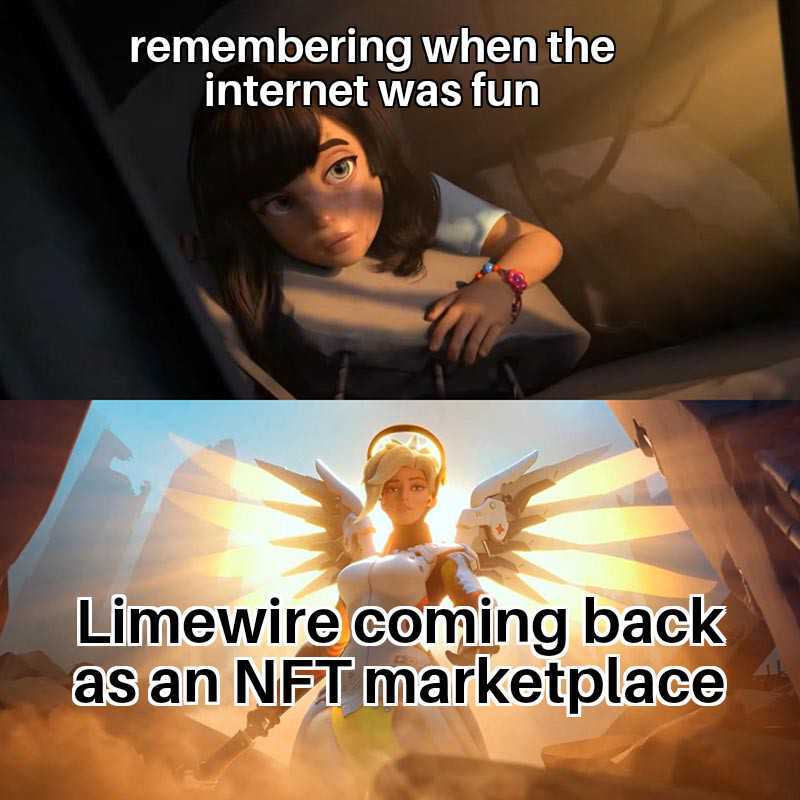Welcome to the March 18th, 2022, edition of the Decentral Weekly Crypto News Wrap-Up, where Neil and Em tackle the same question: “Is this a thing?”
What can you expect from this week’s crypto news-wrap up? We debate headlines about Russians trying to liquidate their cryptocurrency, Coinbase’s new product, Limewire rebranding as an NFT marketplace, and more.
Russians look to liquidate cryptocurrency in UAE

Russians are looking to liquidate billions in cryptocurrency holdings in the United Arab Emirates (UAE), where crypto firms are getting flooded with requests. Some Russians are looking to purchase real estate, while others are trying to convert cryptocurrency into cash. The UAE has previously been clear about hoping to become a blockchain global hub.
Why is this suddenly happening? It’s simple: Russians are getting scared Switzerland might end up freezing their crypto assets any time now. Specifically, the Swiss government has been open about planning to freeze cryptocurrency owned by Russian citizens. This is quite the controversial move, given that many crypto enthusiasts believe crypto was created to avoid situations like this.
What are your thoughts? When can we agree on sanctions when it comes to human rights, or should we accept that “sanctions” will never be the same again, thanks to the rise of cryptocurrency?
Neil says:
Yeah, I think that’s where things get interesting. A lot of crypto enthusiasts know crypto can be used to circumvent sanctions, but there are certainly going to be situations where countries sanction each other. How will the exchanges respond to those governments, and how often will they obey or dismiss the requests? I think this is an important question to explore.
Em says:
I guess this just goes to show that some of the traditional whale investors still see crypto as a speculative asset and not what it’s meant for — an alternative money that should be in self-custody. Trying to figure out how to move it and where to move it to avoid sanctions shouldn’t be the main question if it’s being used for its decentralized purpose.
Bottom line:
Neil thinks this is a big “future issue” thing, Em thinks it is more of a “whale mindset” thing.
Who do you agree with?
Coinbase launches beta Coinbase One subscription

If you’ve followed the cryptocurrency news for a while, you know that Coinbase is one of the major players in the space. The crypto exchange is launching a subscription model-based product called Coinbase One that offers zero trading fees to the user. Coinbase still hasn’t disclosed how much Coinbase One will cost.
Those who opt for Coinbase One also get access to 24/7 customer support and account protection up to $1 million dollars. Users will not be able to share their subscription and will not be reimbursed for previous crypto trading fees. The majority of Coinbase revenues still come from trading fees.
What do you think? Is this a smart move for Coinbase and/or wealthier crypto investors?
Neil says:
Yeah, I think this is a smart move. I would go so far as to say this should’ve rolled out even sooner, as some kind of premium service. It allows Coinbase to diversify its revenue while also catering to people who actively trade 24/7. This is a smart move from Coinbase, in my opinion.
Em says:
I guess a subscription for traders is an interesting idea. If you do a lot of trades, I guess it might be worth it and perhaps there’s a market for it. Everything seems to be a sub these days so I don’t blame Coinbase for trying it out. It’s their prerogative to make money whatever way they want to. It’s also my prerogative not to use it since I’m more of a HODLer than a trader.
Bottom line:
Neil thinks this is a thing, Em doesn’t care too much about it.
Who do you agree with?
Limewire comes back after a decade

If you grew up in the early days of the Internet, then you might remember trying to download music from a file-sharing service called Limewire. Limewire launched in 2000 and eventually attracted 50 million monthly users at its peak.
The music industry eventually helped shut it down in 2010. A federal judge claimed Limewire was responsible for copyright infringement on a “massive scale.” Limewire is often associated with other well-known P2P file sharing services of the time, including Napster, Kazaa, and Bearshare.
After over a decade, Limewire wants to come back as an NFT marketplace. The relaunch is planned for May, thanks to two Austrian brothers who purchased Limewire’s assets and IP last year. Limewire will focus on music-related NFTs rather than digital collectibles in general.
Any thoughts on Limewire’s rebrand? Since Limewire is familiar to millions of millennials, is this a smart play?
Neil says:
Yeah, I’m not going to lie – this is getting a bit annoying. It looks like there are so many millennial brands running straight to the crypto space to try to rebrand themselves, and it would be fine if the projects were working out. I still haven’t really heard much about Radioshack’s rebrand. I think the more revolutionary NFT platforms are going to be original companies, not an older brand trying to come back to life.
Em says:
Lollll most millennials remember Limewire. Good times. Who knows if this NFT marketplace will be any good but I view it kind of like BlockbusterDAO — it’s there for the nostalgia factor. And maybe that’s all it needs to succeed, who knows. But I’m sure all the boomers will be thankful if they’re not getting letters from their ISP saying to stop using P2P file sharing. hahaha.
Bottom line:
Neil thinks this is an annoying thing, Em thinks it’s a coin toss thing.
What do you think?
Yuga Labs acquires 2 NFT collections

When it comes to established NFT projects, there’s probably no bigger name than the Bored Ape Yacht Club, or BAYC. The creator of the BAYC project, Yuga Labs, is looking to capitalize on other NFT collections in the space.
Yuga Labs has acquired the intellectual property rights of both the CryptoPunks and MeeBits NFT collections. This is a massive acquisition considering these are two of the most well-known NFT collections in the sector. CryptoPunks sales skyrocketed as a result.
Yuga Labs clearly wants to be the biggest company in the space. When will consolidation become a major challenge to the principle of decentralization? What do you think about “M&As” within the context of NFTs and cryptocurrency?
Neil says:
It’s a very difficult question that has to be answered. If the company behind the world’s most high-profile NFT collection then ends up snatching up other high-profile collections, it seems kind of inevitable. The problem is: when do the acquisitions get to the point where it’s clear that decentralization is impossible?
Em says:
Considering crypto and blockchain are all supposed to be about decentralization, it doesn’t appeal or sit well when we see consolidation of assets like this. Sure, it’s the market tendency for these things to happen, but when they do, I say: “Let’s burn it down!” Ok, not literally. But you know what I mean — keep breaking up centralization wherever we see it.
Bottom line:
Both Neil and Em agree this is pretty much an inevitable, and unfortunate, thing.
We have a consensus! Do you agree?
EU crypto regulation is one step closer

Many crypto analysts, experts, and enthusiasts have been keeping a close eye on the EU vote regarding cryptocurrency regulation. The Economic and Monetary Committee voted 31-4 in favor of the Markets in Crypto Assets, or MiCA, framework. This was a new draft of the MiCA framework. The MiCA legislation was first introduced in 2020.
We reported last week and agreed that it was probably a good thing the vote was previously postponed, given that a provision was attempting to ban proof-of-work cryptocurrencies like Bitcoin and Ethereum. Instead, the committee voted for a provision that would eventually address the sustainability of crypto mining activities by January 2025.
What are your thoughts on this announcement? How much does this move the needle in Europe, or is this more performative than anything else?
Neil says:
I don’t know how to even celebrate a “regulatory win” when it comes to crypto. Crypto legislation will evolve over the next decade, and there are going to be all sorts of agencies and bodies that demand more from the industry. I guess it’s a win to celebrate cautiously, until some new regulatory hurdles come up.
Em says:
Watching governments and politicians try to figure out how to regulate crypto is kinda hilarious to be honest. It’s almost like when kids are playing freeze tag and the one who’s losing keeps making up new rules so he’s not losing anymore. Regulators still don’t know exactly how crypto works, but gosh darn it, they’re gonna try to regulate it anyway!
Bottom line:
Neil thinks it’s an evolving process thing, Em thinks it’s a freeze tag thing.
Who’s side are you on?
Bad idea of the week: trading a million for less than a penny

Many NFT buyers are hoping to become the next crypto millionaire, especially given that 2021 was a banner year for non-fungible tokens in general. Unfortunately, this next situation involves an NFT collector who has to start from square one.
A collector named Dino Dealer took to Twitter to admit he had sold an EtherRock for much less than intended. Dino Dealer had accidentally listed his EtherRock #444 for 444 WEI instead of 444 ETH. The NFT was immediately purchased and has since been relisted for sale. Dino Dealer admitted his net worth of around $1 million had just disappeared.
The Internet can be a ruthless place, and this situation was no exception. Many anti-crypto and anti-NFT accounts dogpiled on Dino Dealer, with some accounts asking why he had his “net worth in a rock jpeg.” Other pro-crypto accounts urged others to be more sensitive to the situation.
Yep, it’s another “I accidentally sold for x” horror story. Thoughts on what happened here?
Neil says:
I’m not here to “dunk” on this guy, because it honestly really is wild that someone can lose that much money that quickly. I think the immutability of the blockchain does mean we will have to figure out ways to recover from human error, but I’m not positive what that looks like. Regardless, it’s another cautionary tale about double-checking everything before buying, selling, listing, sending, or receiving anything.
Em says:
Ooooof. As a butterfingers myself, I know that this kind of thing can happen to anyone. If I had an EtherRock, you best believe I’d be super careful with it! But beyond just cringing and awkwardly chuckling at the self-imposed misfortune, I think it’s a good reminder about diversification. Is your net worth really $1 million when you can lose it with one mis-click?
Bottom line:
Both Neil and Em can empathize with this week’s bad idea. Also, never put all of your money into one NFT!
What do you think?
Meme of the week
As always, Em brings you the meme of the week:

And that’s our crypto news wrap-up!
On a scale of 1 to 10, how confident are you that Limewire will be able to rebrand as an NFT marketplace? Are you worried about Yuga Labs becoming the “Amazon” of the NFT space, or is it too early to care about anything other than growth right now? What would you do if you accidentally sold your most prized NFT for less than a penny?
Make sure to tweet us your thoughts/opinions/perspectives at @decentralpub with the hashtag #weeklycryptonews on Twitter.


